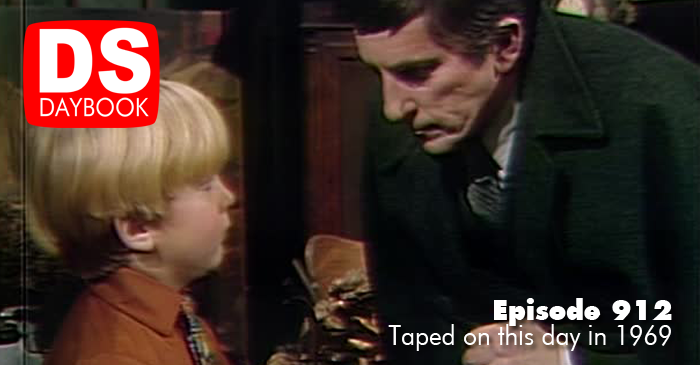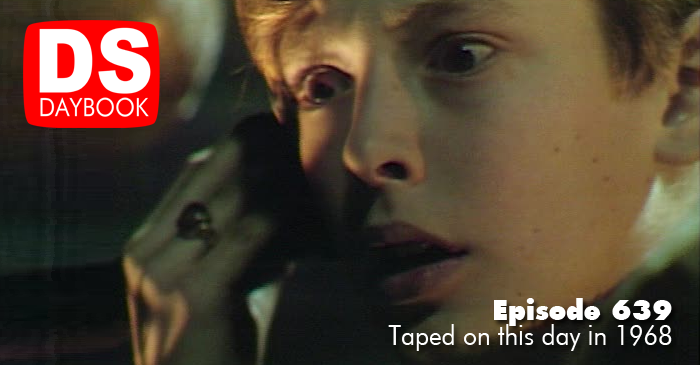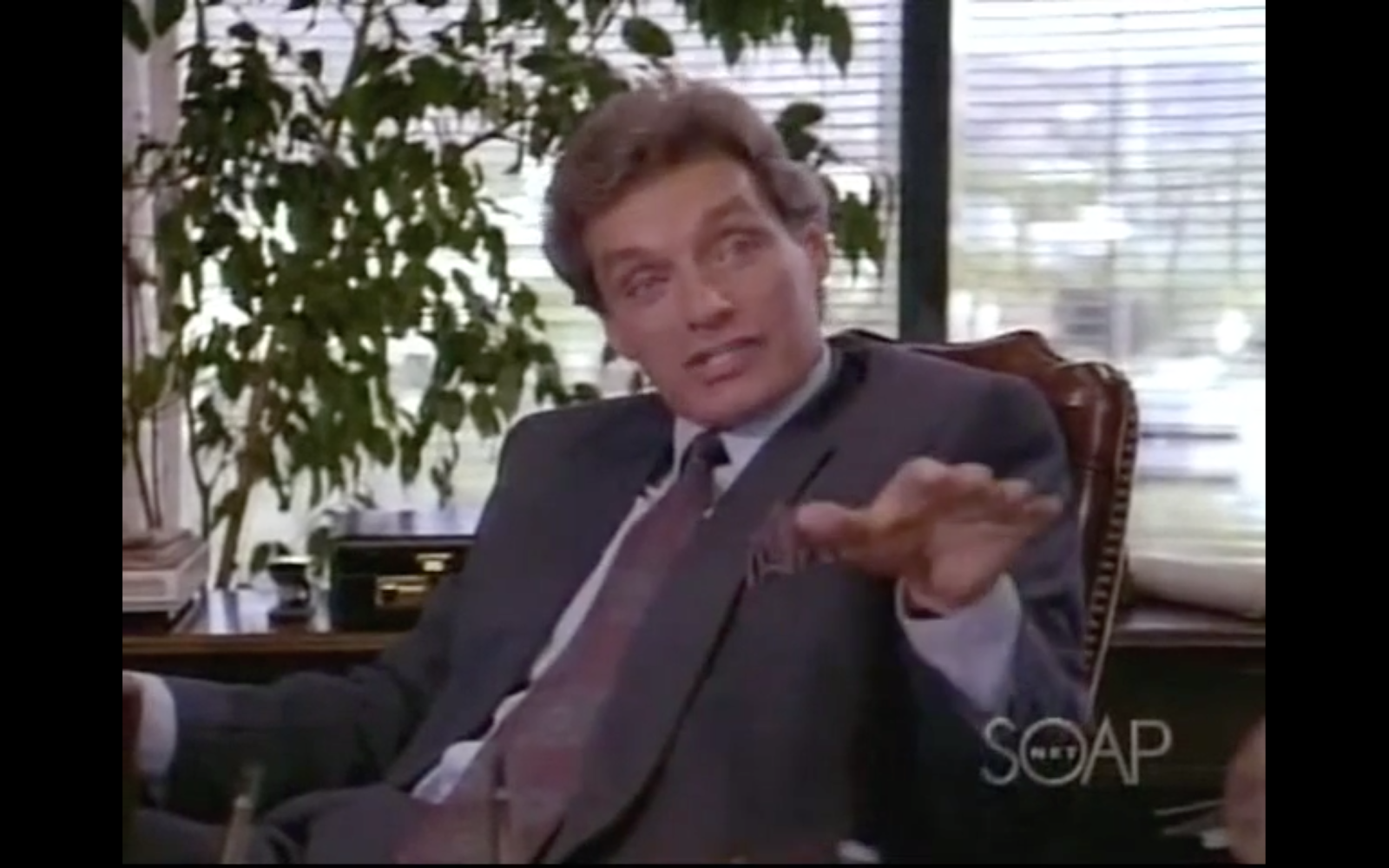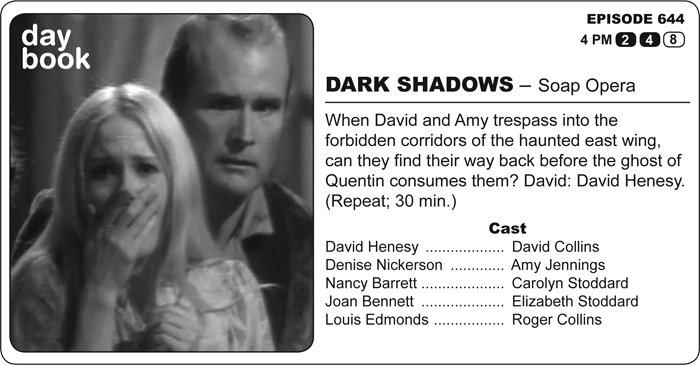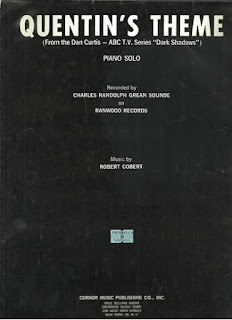By PATRICK McCRAY
Taped on this date in 1969: Episode 912
Who’s blonde, diminutive, power hungry, and may be looking at a spanking from Barnabas? For once, it’s not Carolyn. But who? Chris Jennings: Don Briscoe. (Repeat; 30 min.)
Barnabas must exert increasing control on Alexander as Amy is pulled into the fold of the Leviathans. Julia tracks down Harrison Monroe, who tries to scare her off like an Oz potentate. An assertion that she has news from Charles Delaware-Tate grants her entry into Monroe’s house.
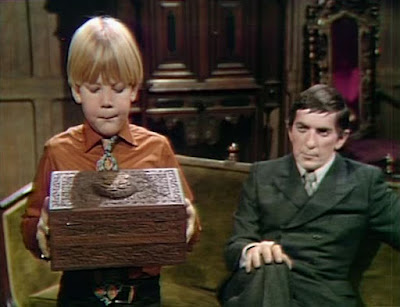 1897 rubs off on a guy. Well, guys like Sam and Gordon, those irrepressible upstarts in the writer’s room. That storyline had been the show’s most creatively dense endeavor, built around the core mystery of a ghost assassin and his motives. Surrounding that was a parade of other weird tales and eccentric wackos, making the sequence as elaborate and ornate as the era housing it. The program’s next core story -- Julia opposing a demonic messiah bent on world domination -- was even more ambitious. Even if their reach exceeded their grasp with the execution of that sequence, the writers told the myriad associated and coincidental stories with inventive brio. Paul Stoddard lives! Josette finally goes to haunt someone else for a change. There’s the last we see of Chris Jennings. An avenging Angelique. The return of Nicholas Blair. Heck, the return of Quentin and the mystery of Grant Douglas. They even find time to bring back Amanda Harris, square off with a personified version of death, and dramatize the myth of Orpheus and Eurydice. I’m pretty certain that a giant spider is involved, and somewhere, the lost castaways of the Minnow feel safer. There’s even a flashback to the 1940’s. This is only in the space of about 3-4 months. Sounds like a long time, right? You’ve been spoiled.
1897 rubs off on a guy. Well, guys like Sam and Gordon, those irrepressible upstarts in the writer’s room. That storyline had been the show’s most creatively dense endeavor, built around the core mystery of a ghost assassin and his motives. Surrounding that was a parade of other weird tales and eccentric wackos, making the sequence as elaborate and ornate as the era housing it. The program’s next core story -- Julia opposing a demonic messiah bent on world domination -- was even more ambitious. Even if their reach exceeded their grasp with the execution of that sequence, the writers told the myriad associated and coincidental stories with inventive brio. Paul Stoddard lives! Josette finally goes to haunt someone else for a change. There’s the last we see of Chris Jennings. An avenging Angelique. The return of Nicholas Blair. Heck, the return of Quentin and the mystery of Grant Douglas. They even find time to bring back Amanda Harris, square off with a personified version of death, and dramatize the myth of Orpheus and Eurydice. I’m pretty certain that a giant spider is involved, and somewhere, the lost castaways of the Minnow feel safer. There’s even a flashback to the 1940’s. This is only in the space of about 3-4 months. Sounds like a long time, right? You’ve been spoiled.In the first year or two of the program, it would have taken nine weeks just to show Liz buttering a piece of toast. But after 1897, this storyline density is the standard for the audience and maybe the writers, themselves. And they still have not exhausted themselves. So, while we’re at it, let’s briefly turn the show into The Wild Wild West. When it comes to the final days of Charles Delaware-Tate, not only do the writers turn it into yet another plot thread, they memorably resolve a character who didn’t really need a resolution. I suspect it answers the demands of no one, and it answers them with a generous panache that overcomes the most steadfast apathy. It’s an era of mini-mysteries -- little adventures and diversions whose only real problem is being more interesting than the Leviathan A plot they decorate. Notice that the B plots evaporate around the time that Jeb enters. They pad out just enough time for the Leviathan baby to grow up into a soap opera heartthrob. And Christopher Pennock certainly deserves the singular attention of the show. Unfortunately, the A plot doesn’t match nor enhance his talent. It’s a tall challenge to compete with the recent memory of the android duplicate of a 100 year-old Roger Davis. Trust me, I've tried.
The show has really entered a fascinating point in its transformation. Almost all of the mini-plots resolve loose ends that tied the show to the past, earliest days. Who would have thought that, in so short a time, we would get the death of Paul Stoddard, emotionally wound Carolyn so severely that her man chasing days end, watch Josette tell Barnabas to get over it, already, say goodbye to Chris and Amy, deal with Amanda Harris -- for whatever that is worth, see Angelique get married and overcome, for her longest stretch, her obsession with Barnabas... and enjoy the security that Quentin, a little less than a year after meeting him, is now a threat to no one?
In the most macroscopic sense, the Leviathans are the least important thing going on. This segment of the show is like a KonMari exercise in clutter busting. Unless it gives joy to the audiences and writers, out it goes. Many of these plot elements have gone beyond motivating the characters. Instead of driving them to a destination, they are just, like Josette with Barnabas, driving them in circles.
This has an interesting effect on the next storyline. (And it almost makes me wonder if they were intending to stay in Parallel Time had the ratings been high enough.) Parallel Time is certainly enticing because our major concerns and questions have just been answered or eliminated in Primary Time. The other edge to that sword cuts out a lot of suspense and urgency to get back from Parallel Time. Once things get to that point in that dimension, the main reason to come home is to escape from, rather than escape to.
Because the Leviathan storyline kind of just ends, and then ends again with Jeb's subsequent death, it feels a little bit like a non sequitur for the Dark Shadows universe. I really strain to try and come up with things outside of Carolyn that are permanently changed, subtracted from, or added to by the Leviathan storyline. As far as the overall story of the series goes, these little subplots were not diversions, fillers, and misdirections as the Leviathan story developed. It's the other way around. The arguably disposable Leviathan storyline now feels like the MacGuffin while the real action of resolving many of the show’s mysteries is executed with surprising efficiency.
After Parallel Time, what's left? Literally, the apocalypse. From episode 1, the program was telling us that we were welcomed at both the beginning and the end of the world. The road is finally clear to deliver it.

